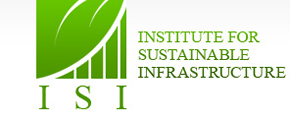 WASHINGTON D.C. – The Institute for Sustainable Infrastructure (ISI) in collaboration with the Zofnass Program for Sustainable Infrastructure at the Harvard University Graduate School of Design (GSD) unveiled today a new infrastructure rating system, called Envision™. The system is designed to help policy makers evaluate the sustainability of infrastructure, set realistic national priorities, and conduct a national discourse on infrastructure investment. Through a holistic approach, the Envision™ system rates all types and sizes of civil infrastructure projects, and does so in terms of environmental, economic and community benefits.
WASHINGTON D.C. – The Institute for Sustainable Infrastructure (ISI) in collaboration with the Zofnass Program for Sustainable Infrastructure at the Harvard University Graduate School of Design (GSD) unveiled today a new infrastructure rating system, called Envision™. The system is designed to help policy makers evaluate the sustainability of infrastructure, set realistic national priorities, and conduct a national discourse on infrastructure investment. Through a holistic approach, the Envision™ system rates all types and sizes of civil infrastructure projects, and does so in terms of environmental, economic and community benefits.
The holistic approach of Envision™ provides a complete framework of assessment, covering all major civil infrastructure project types, scales, contexts, and project phases. Infrastructure owners, engineers, contractors and regulators can address all major infrastructure project stages: planning and design, construction, operations and maintenance, and decommissioning.
“The new sustainable infrastructure rating system will evaluate, grade and give recognition to infrastructure projects that provide progress and contributions for a sustainable future. Its purpose is to foster a necessary and dramatic improvement in the performance and resiliency of physical infrastructure,” said Institute for Sustainable Infrastructure Executive Director Bill Bertera.
“We are at the height of a national discussion concerning the condition of our nation’s civil infrastructure and how to finance its future development,” said Paul Zofnass, founder of the Zofnass Program for Sustainable Infrastructure. “Designers, infrastructure decision-makers, and the public currently face a proliferation of sustainability rating tools, most of which focus on the performance of a particular infrastructure element. Envision™ is unique in that it focuses on infrastructure’s total contribution to the environment, economy and society.”
Envision™ directly ties rating system points to measurable benefits, as estimated by state-of-the-practice economic analysis. Using evidence from economic research, the full value of infrastructure would be captured and aligned with the Credits and Points in Envision™ across various infrastructure characteristics. In this way, the rating system will be used to more fully account for the impacts that are not included in standard financial measures, and do so in ways that are consistent with economic theory and evidence.
“The professionals who design and build these projects face a tall order to satisfy ever-growing demand for infrastructure, while at the same time responsibly addressing potential environmental and economic effects,” said Tim Psomas, Chair of the ISI Board of Directors. “Envision™ will allow project sponsors to better articulate the costs and benefits of infrastructure development by revealing the full value of projects including contributions to job creation, triple bottom line outcomes (social, environmental, economic), enhancements to community resilience and regional competitiveness.”
Educational programs will be offered in conjunction with the rating system’s release, to not only train individuals to use Envision™, but to incorporate systems-level thinking into their approach to sustainability, considering the broader, often-overlooked impacts of a project. In addition to the release of Envision™, the Institute for Sustainable Infrastructure and the Zofnass Program for Sustainable Infrastructure plan to release two companion tools this year; a pre-planning checklist for assessing project sustainability in increasing awareness of issues, and a comprehensive guidance document and score calculator that allows users to analyze and rate a project’s levels of achievement for sustainability objectives. Both tools are under development and are important steps in realizing the goal for a holistic system.
For more information on the new Envision™ Sustainable Infrastructure Rating System, visit the ISI website or the Zofnass Program for Sustainable Infrastructure at the Harvard University Graduate School of Design website: www.sustainableinfrastructure.org, or www.gsd.harvard.edu/research/research_centers/Zofnass/.
About ISI
The Institute for Sustainable Infrastructure is a not-for-profit association of the American Society of Civil Engineers, the American Council of Engineering Companies and the American Public Works Association. Its purpose is to improve the performance and viability of infrastructure through the application of more sustainable technologies and methodologies.
About the Zofnass Program for Sustainable Infrastructure The Zofnass Program for Sustainable Infrastructure (gsd.harvard.edu/research/research_centers/zofnass/) is a research organization based within Harvard University’s Graduate School of Design, extending its activities throughout the Harvard schools of Public Health, Government, Business and the Center for the Environment. It is supported and advised by founders Paul and Joan Zofnass, and various industry partners.
ISI Co-founding Organizations:
About APWA
The American Public Works Association (www.apwa.net) is a not-for-profit, international organization of more than 28,500 members involved in the field of public works. APWA serves its members by promoting professional excellence and public awareness through education, advocacy and the exchange of knowledge. APWA is headquartered in Kansas City, Missouri, has an office in Washington, D.C. and 63 chapters in North America.
About ASCE
Founded in 1852, the American Society of Civil Engineers (www.asce.org) represents more than 140,000 members of the civil engineering profession worldwide and it America’s oldest national engineering society.
About ACEC
The American Council of Engineering Companies (ACEC) is the business association of America’s engineering industry. Council members numbering more than 5,000 firms and representing more than 50,000 employees throughout the national are engaged in the development of America’s transportation, water and energy infrastructure, as well as environmental, industrial, and other public and private facilities. Founded in 1909 and headquartered in Washington D.C., ACEC is a federations of 51 state and regional organizations.
Media Contacts
Bill Bertera, Institute for Sustainable Infrastructure,
+1 202 218 6725
bertera@sustainableinfrastructure.org
Laura Bynum, APWA Media Relations Manager
+1 202 218 6736
lbynum@apwa.net











